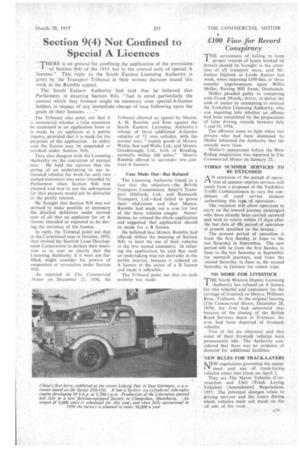Section 9(4) Not Confined to Special A Licences
Page 31

If you've noticed an error in this article please click here to report it so we can fix it.
THERE is no ground for confining the application of the provisions • of Section 9(4) of the 1953 Act to the control only of special A licences." This reply to the South Eastern Licensing Authority is given by the Transport Tribunal in their written decision issued this week in the Rumble appeal.
The South Eastern Authority had said that he believed that Parliament, in enacting Section 9(41, "had in mind particularly the control which they foresaw might be necessary over special-A-licence holders in respect of any immediate change of base following upon the grant of their licences...."
The Tribunal also point out that it is immaterial whether a false statement be contained in an application form or is made by an applicant at a public inquiry, provided that it is made for the purposes of the application. In either case the licence may be suspended or . revoked under Section 9(4).
They also disagree with the Licensing Authority on the restriction of normal :user. He held the opinion that the giving .of an undertaking tel use A. licensed vehicles for work for only two named customers was never intended by Parliament when Section 9(4) was enacted and that to use the sub-section for that purpose would not be desirable in the public interest.
Re thought that Section 9(4) was not devised to make possible or necessary the detailed definition under normal user of all that an applicant for an A licence intended or expected to do daring the currency of his licence.
In reply, the Tribunal point out that in the Carmichael case in October, 1955, they invited the Scottish Land Development Corporation to declare their intention as to user so clearly that the Licensing Authority, if it were not fulfilled, might consider his powers of suspension or revocation under Section 9(4).
As reported in The Commercial llotor on December 21, 1956, the Tribunal allowed an appeal by Messrs. A. H. Rumble and Sons against the South Eastern Licensing Authority's refusal of three additional A-licence vehicles of 7i tons unladen, with the normal user, "mainly goods of Messrs. Wallis, Son and Wells, Ltd., and Messrs. Goodenough, Ltd., both of Reading, normally within 100 miles," Messrs. Rumble offered to surrender two contract-A licences.
Case Made Out—But Refused
The Licensing Authority found as a fact that the objectors—the British Transport Commission, Amey's Transport (Oxford), Ltd., and Rowstock "Fran sport, Ltd.—had failed to prov.e their' objections and that Messrs. Rumble had made out a case for two of the three vehicles sought. Nevertheless, he refused the whole application and suggested that application should be made for a 11 licence.
He believed that Messrs. Rumble had offered, within the meaning of Section 9(4), to limit the use of their vehicles to the two named customers. In refusing the application, he said that such an undertaking was not desirable in the public interest, because it reduced an A licence to the status of a B licence and made it inflexible.
The Tribunal point out that no such promise was made.




























































































